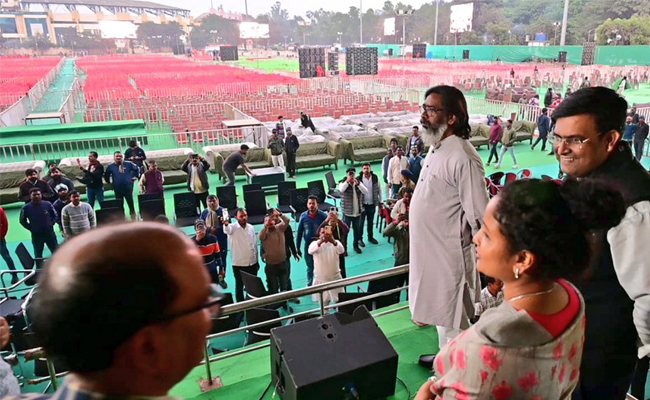New Delhi (PTI): You cannot be "touchy" in politics, the Supreme Court observed while hearing Union Minister of State for Information and Broadcasting L Murugan's plea relating to a criminal defamation proceeding initiated against him.
Murugan approached the apex court last year, challenging a September 5, 2023, Madras High Court order in which it had refused to quash the proceeding against him on a complaint filed by Chennai-based Murasoli Trust for his alleged defamatory statements during a December 2020 press conference.
While agreeing to hear his petition on September 27 last year, the top court stayed the proceeding against Murugan that was pending in a special court in Chennai.
The apex court had also sought the Trust's response on his plea challenging the high court order.
When the matter came up for hearing before a bench of Justice BR Gavai and Justice KV Viswanathan on Friday, the counsel appearing for Murugan said, "Where is the question of defamation in this case?"
The lawyer appearing for the Trust sought an adjournment in the matter.
"You cannot be touchy in politics," the bench observed.
"Put up after four weeks at the request of the counsel for the respondent," the apex court said.
Murugan had earlier approached the high court, challenging the proceeding initiated against him.
The high court had noted in its order that according to the Trust, Murugan made the statements "with an ulterior motive to degrade and tarnish the reputation of the Murasoli Trust in the eyes of the general public".
"While dealing with the quash petition, this court cannot go into the merits of the case or the disputed questions of fact. This court has to merely go by what is alleged in the complaint and prima facie find out as to whether the offence is made out," the high court had said.
"In an offence of defamation, the statements have to be tested only from the point of view of a common prudent man, who comes across the defamatory statements made," it had said.
While dismissing the petition, the high court had directed the trial court to dispose of the case within three months.
"It is left open to the petitioner (Murugan) to raise all the grounds before the trial court and the same will be considered on its own merits and in accordance with law," it had said.
Let the Truth be known. If you read VB and like VB, please be a VB Supporter and Help us deliver the Truth to one and all.
Bengaluru: A recent study commissioned by the Karnataka government has revealed that 28% of the state's 328.55-km coastline is experiencing high levels of erosion. The report, submitted by the National Centre for Sustainable Coastal Management to the Environment Department, shows that the length of eroding stretches has more than doubled, from 43.7 km in 1990 to 91.6 km in 2024.
Titled Shoreline Management Plan Along Karnataka Coast, the report highlights the impact of increased sediment barriers and upstream activities on coastal erosion. It also calls for the adoption of nature-based solutions to counter the effects of climate change and human activities.
District-wise findings
The coastline of Uttara Kannada, Udupi, and Dakshina Kannada spans 328.55 km, with varying levels of erosion across the districts:
Uttara Kannada: Although 28% of its 193-km coastline is eroded, the district accounts for 39% of the state’s total erosion due to increased coastal development.
Udupi: Despite 43% of the coastline being protected by seawalls, 38% remains affected by erosion, contributing to 32% of Karnataka's overall erosion.
Dakshina Kannada: The district’s 37-km coastline faces “critical” erosion, with 39% of its stretches severely impacted, including areas such as Uchil and Batapady.
The report warns that coastal erosion threatens habitations, estuarine environments, mangroves, mudflats, and fish landing areas.
Recommendations
Identifying 44 critical erosion zones, the report suggests:
1. Beach nourishment through sand replenishment.
2. Rehabilitation of sand dunes and bioshields.
3. Mangrove afforestation to stabilise coastlines and support fisheries.
The findings will inform the Karnataka-Strengthening Coastal Resilience and the Economy (K-SHORE) project, which prioritises nature-based solutions over hard approaches like seawalls. R Gokul, Additional Principal Chief Conservator of Forests, stated that the Rs 840-crore project will focus on mangrove planting, beach nourishment, and tackling plastic pollution. These measures aim to protect the coastline and boost the blue economy.
The report will also guide the Karnataka State Coastal Zone Management Authority in reviewing coastal development proposals.




